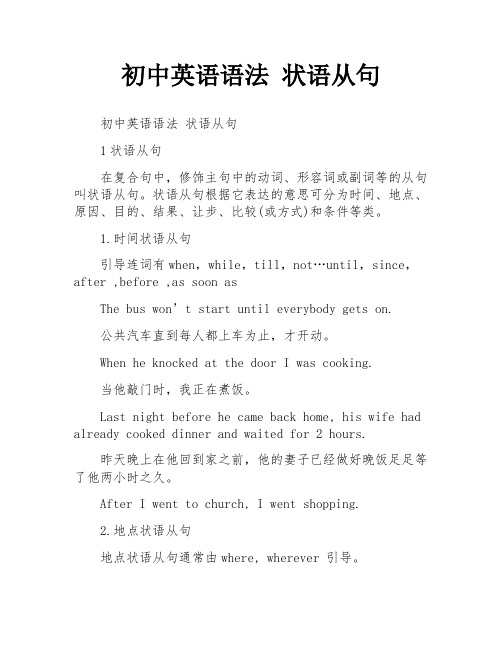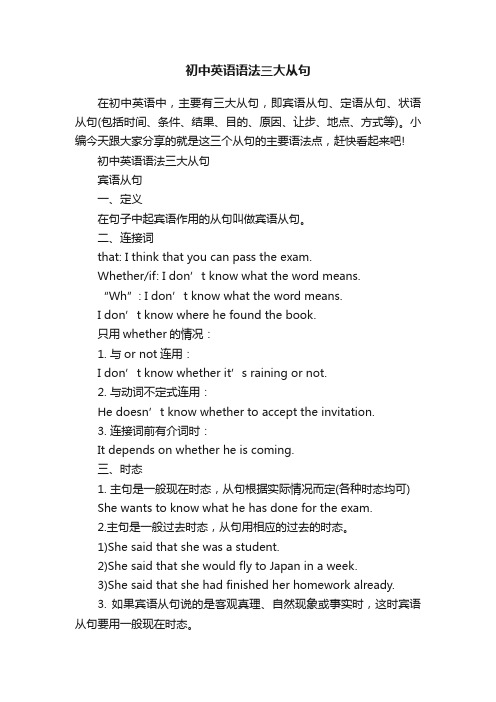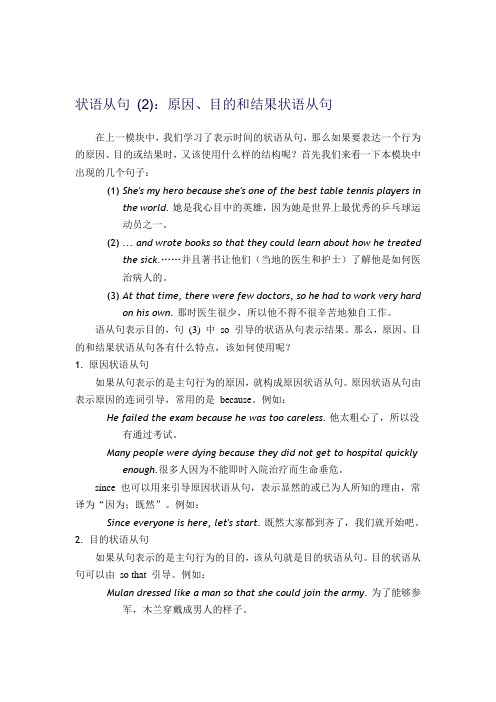初中英语 原因、目的和结果状语从句详解
九年级英语原因结果和目的状语从句语法规律总结

九年级英语原因结果和目的状语从句语法规律总结原因、结果和目的状语从句。
1.原因状语从句(1)because引导的原因状语从句because作连词,意为“因为”,表示必然的因果关系,语气较强,通常放在主句之后,若需强调则放在主句之前,常用来回答疑问词why提出的问题。
because引导的原因状语从句有时可与because of短语换用。
because和so在一个句子中不能同时使用。
I went to see a doctor because I had a cold.我去看医生,因为我感冒了。
-Why are you anxious?-为什么你很着急-Because my bike is broken.-因为我的自行车坏了。
(2) since引导的原因状语从句since,意为“因为;由于;既然”,侧重主句,从句表示显然的或已知的理由,常放在句首。
Since we are young , we shouldn’t be afraid of making mistakes.既然我们还年轻,我们不该害怕犯错误。
2.结果状语从句so常用来连接并列句,前一分句表示原因,后一分句表示结果。
so和since不能连用. They worked very hard , so they could finish the work before supper.他们拼命地干活,所以在晚饭前就能把工作做完。
It is very cold outside ,so I wore a heavy coat.外边很冷,所以我穿了一件厚大衣。
3.目的状语从句so that 引导的目的状语从句中通常带有can , could , may , might ,should 等情态动词。
so that 引导的从句在主句后,从句前不用逗号,有时可省略that。
I will tell you all the facts so that you can judge for yourself.我会告诉你所有的事实以便你可以自己判断。
状语从句知识点详解(初中英语专项复习)14

状语从句知识点详解(初中英语专项复习)状语从句的概念: 用一个句子作状语来修饰动词和形容词,以表明动作发生或状态存在的时间、地点、原因等,这个句子就叫做状语从句。
状语从句的分类:状语从句共分为九大类,包括:时间、地点、原因、条件、让步、目的、结果、方式、比较状语从句。
下面分别讲解:一、时间状语从句概念:用来表示时间的状语从句,由when, while, as, till, until,before, after, since等引导。
由于时间状语从句的引导词所表示的意思并非一致,不同引导词表达不同的时间,它们在句子中对应的时态、语态等也有所不同。
例如:when /while引导的时间状语从句when引导的从句的谓语动词通常是瞬间动词,也可以是延续性动词。
从句动作可与主语动作通常先后发生也可同时发生。
I was writing when my sister came back.( come是瞬间动词,只能用when引导,不能用while)He often wrote me when/while he studied in Shanghai International Studies University.( study 是延续性动词,while可代替when)While my mother was cooking , I was playing chess with dad. (cook是延续性的动词,cook和play同时发生)I like playing chess while my sister likes reading stories.我喜欢下棋,而我姐姐喜欢看小说。
(while表示对比)when和while的区别还有:while引导的时间状语从句多用于进行时态,而when引导的时间状语从句多用于一般时态。
While we were playing games, our headmaster called me .我们正在做游戏的时候,校长叫我了。
初中英语知识点归纳状语从句的分类和用法

初中英语知识点归纳状语从句的分类和用法状语从句是英语语法中重要的一部分,它用来修饰主句的动作或描述情况的,在句子中起着状语的作用。
状语从句分为时间状语从句、条件状语从句、原因状语从句、目的状语从句、结果状语从句、方式状语从句和比较状语从句等。
下面将对初中英语中常见的状语从句分类和用法进行归纳。
一、时间状语从句时间状语从句用来表示动作或事件发生的时间,包括连词when (当...时候),while (在...时候),before (在...之前),after (在...之后),as (当),since (自从),until (直到)等。
时间状语从句一般放在主句之前或者之后。
例如:- When I was young, I used to play soccer with my friends. (当我年轻的时候,我常常和朋友们踢足球。
)- After she finished her homework, she went to bed. (她完成作业之后,去睡觉了。
)二、条件状语从句条件状语从句用来表示主句动作的条件或前提,包括连词if (如果),unless (除非),in case (以防),as long as (只要),provided/providing (只要)等。
条件状语从句一般放在主句之前。
例如:- If it rains tomorrow, we will stay at home. (如果明天下雨,我们就在家呆着。
)- Unless you work hard, you won't pass the exam. (除非你努力学习,否则你就不能通过考试。
)三、原因状语从句原因状语从句用来表示主句动作或情况的原因,包括连词because (因为),as (因为),since (因为),for (因为),now that (既然)等。
原因状语从句一般放在主句之前。
例如:- Because it was raining, we stayed at home. (因为下雨,我们呆在家里。
初中英语语法 状语从句

初中英语语法状语从句初中英语语法状语从句1状语从句在复合句中,修饰主句中的动词、形容词或副词等的从句叫状语从句。
状语从句根据它表达的意思可分为时间、地点、原因、目的、结果、让步、比较(或方式)和条件等类。
1.时间状语从句引导连词有when,while,till,not…until,since,after ,before ,as soon asThe bus won’t start until everybody gets on.公共汽车直到每人都上车为止,才开动。
When he knocked at the door I was cooking.当他敲门时,我正在煮饭。
Last night before he came back home, his wife had already cooked dinner and waited for 2 hours.昨天晚上在他回到家之前,他的妻子已经做好晚饭足足等了他两小时之久。
After I went to church, I went shopping.2.地点状语从句地点状语从句通常由where, wherever 引导。
Where there is a will, there is a way. 哪里有志向,哪里就有出路。
有志者事竟成。
Where there is a life, there is a hope. 哪里有生命,哪里就有希望。
留得青山在,不怕没柴烧。
Wherever you go, whatever you do, I will be right here waiting for you.不管你去哪里,不管你做什么,我都会在此守侯你。
3.原因状语从句引导连词有because,as, since。
He didn′t see the film because he had seen it.他没有看那部电影,因为他已经看过了。
They couldn’t get on the train,for it was too crowed.比较:because, since, as和for1)because语势最强,用来说明人所不知的原因,回答why提出的问题。
原因、目的和结果状语从句

B.He has so little time that he can’t go to the cinema with you.
(11) 如果主从句的主语相同,并且从句是否定的形式, 可以用too...to...句型转化。 too+形容词/副词+to do
原因状语从句
原因状语从句:从句表示的是主句行为的原因。通 常由because, since, as, for引导。
(1) because表示直接原因(听话人所不知的),语气 最强,引导原因状语从句多放在主句之后。 回答由why提出的问题,只能用because。此外, because和so不能同用在一个句子里。
Speak clearly so that they may understand you. (目的状语从句)
Jack is badly ill so that he has to rest. (结果状语从句)
用于目的状语从句,还有:
so as to…(肯定结构) eg. He got up early so as to catch the early train.
(4) for表示所说的理由是一种补充说明,for引导的从句一 般不放在句子的开头。 如: I decided to stop and have lunch, for I was feeling quite hungry.
Eg: 1. I was late for class yesterday _b_e_c_a_u_s_e there was
例如: He was so excited that he couldn't go to sleep that night. = He was too excited to go to sleep that night.
原因目的和结果状语从句

in order that …
eg. He got up early in order that he could catch the early train.
in order to… eg. He got up early in order to catch the early train.
有时上述两种结构是可以互换的。 例
如: It was such a wonderful film that all of us wanted to
6
判断以下句子是目的状语从句还是条件状语从句?
练习: 1. I hurried __s_o__t_h_a_It wouldn't be late for class. 2. We should go by bus _____s_o_ twheatcan get there earlier. 3. May I sit nearer_____s_o__thIactan see more clearly?
例如:--Why aren’t going there? --Because I don’t want to.
since now that,“因为…,既然…, 鉴于…” 表示显然的或已为人知的理由,语气较because弱
例如:Since the rain has stopped,let’s go for a walk. 既然雨停了,我们出去散散步吧。
3
目的状语从句
4
目的状语从句: 从句表示的是主句行为的目的 (1)通常由 so that, in order that(为了,以便)引导。 例: We started early so that we could catch the first train. We used the computer in order that we might save time.
初中英语语法三大从句

初中英语语法三大从句在初中英语中,主要有三大从句,即宾语从句、定语从句、状语从句(包括时间、条件、结果、目的、原因、让步、地点、方式等)。
小编今天跟大家分享的就是这三个从句的主要语法点,赶快看起来吧!初中英语语法三大从句宾语从句一、定义在句子中起宾语作用的从句叫做宾语从句。
二、连接词that: I think that you can pass the exam.Whether/if: I don’t know what the word means.“Wh”: I don’t know what the word means.I don’t know where he found the book.只用whether的情况:1. 与or not连用:I don’t know whether it’s raining or not.2. 与动词不定式连用:He doesn’t know whether to accept the invit ation.3. 连接词前有介词时:It depends on whether he is coming.三、时态1. 主句是一般现在时态,从句根据实际情况而定(各种时态均可)She wants to know what he has done for the exam.2.主句是一般过去时态,从句用相应的过去的时态。
1)She said that she was a student.2)She said that she would fly to Japan in a week.3)She said that she had finished her homework already.3. 如果宾语从句说的是客观真理、自然现象或事实时,这时宾语从句要用一般现在时态。
The teacher said that the earth goes round the sun.定语从句一、定义在复合句中修饰名词、代词的从句叫定语从句。
状语从句 (2):原因、目的和结果状语从句

状语从句(2):原因、目的和结果状语从句在上一模块中,我们学习了表示时间的状语从句,那么如果要表达一个行为的原因、目的或结果时,又该使用什么样的结构呢?首先我们来看一下本模块中出现的几个句子:(1) She's my hero because she's one of the best table tennis players inthe world. 她是我心目中的英雄,因为她是世界上最优秀的乒乓球运动员之一。
(2) ... and wrote books so that they could learn about how he treatedthe sick.……并且著书让他们(当地的医生和护士)了解他是如何医治病人的。
(3) At that time, there were few doctors, so he had to work very hardon his own. 那时医生很少,所以他不得不很辛苦地独自工作。
语从句表示目的,句(3) 中so 引导的状语从句表示结果。
那么,原因、目的和结果状语从句各有什么特点,该如何使用呢?1. 原因状语从句如果从句表示的是主句行为的原因,就构成原因状语从句。
原因状语从句由表示原因的连词引导,常用的是because。
例如:He failed the exam because he was too careless. 他太粗心了,所以没有通过考试。
Many people were dying because they did not get to hospital quickly enough.很多人因为不能即时入院治疗而生命垂危。
since 也可以用来引导原因状语从句,表示显然的或已为人所知的理由,常译为“因为;既然”。
例如:Since everyone is here, let's start. 既然大家都到齐了,我们就开始吧。
- 1、下载文档前请自行甄别文档内容的完整性,平台不提供额外的编辑、内容补充、找答案等附加服务。
- 2、"仅部分预览"的文档,不可在线预览部分如存在完整性等问题,可反馈申请退款(可完整预览的文档不适用该条件!)。
- 3、如文档侵犯您的权益,请联系客服反馈,我们会尽快为您处理(人工客服工作时间:9:00-18:30)。
注意
so that (in order that)引导的状语从 句可用 “to ” 或者“in order to ” 转 换成简单句
eg: -- He got up early so that (in order that ) he could get to school on time. -- He got up early in order to (to) get to school on time.
他早起以便能准时到校。
in order to + 短语 -- Mulan dressed like a man in order to join the army.
in order that + 从句 --Mulan dressed like a man in order that she could join the army. 为了能够参军,木兰装扮成男人的样子。
so that 与 so 的区别
so that 引导的目的状语从句中,含有表 示可能性( could, can, will, may…)的词语
-- He got up early so that he could get to school on time.
他早起以便能准时到校。 --You must speak louder so that you can be heard by all.
so 因此,结果
so 因此,结果
eg: -- He worked too hard, so he fell ill again. -- 他工作过于劳累,结果又病倒了。
Try
我们要坐的近一点,以便能听得更清 楚。
-- We’ll sit nearer, so we can hear much better.
因为害怕,所以我昨天晚上没有外出。
注意
because和so不能同用在一个句子里。
eg: --Because it was raining, we stayed at home. -- It was raining, so we stayed at home.
因为下雨,所以我们待在家里。
since 既然… 鉴于… now that
为了能让所有人听见,你必须说大声一点。
eg: --Since the rain has stopped let’s go for a walk.
既然雨停了,我们出去散散步吧。 Try
既然今天你有空,你能帮我补习数学吗?
Since you are free today, could you help me with my maths?
so that = in order that 为了… ,以便…
because 因为…所以…
sinc因为…所以…
用法: 回答由Why 提出的问题
例: --Why aren’ t you going there? 你为什么不去那里?
-- Because I don’t want to. 因为我不想去。
--I didn’t go out last night, because I was afraid.
so 因此
so that = in order that 为了… ,以便…
eg: --You must speak louder so that you can be heard by all. -- You must speak louder in order that you can be heard by all.
